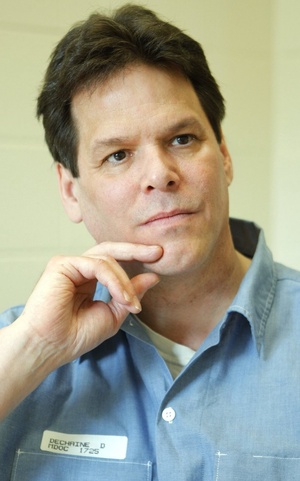PORTLAND – A judge has ordered the state’s crime lab to compare a partial DNA profile – collected from the thumbnail of a 12-year-old murder victim in 1988 – against Maine’s database of 21,000 DNA samples from convicted felons.
Friday’s ruling by Justice Carl O. Bradford at Cumberland County Superior Court was seen as a rare legal victory for Dennis Dechaine, the Bowdoinham farmer convicted of kidnapping and murdering Sarah Cherry.
Dechaine’s lead defense lawyer, Steve Peterson of Rockport, requested the DNA database comparison as part of Dechaine’s latest bid for a new trial.
The pending appeal, filed in 2008, is based on DNA evidence that was not available at the 1989 trial. Analysts from the state crime lab and private labs examined part of Sarah Cherry’s thumbnail, which was clipped during her autopsy. The labs discovered a partial, mixed DNA profile that was consistent with Cherry and at least one other person, an unknown male. The sample was not a match for Dechaine.
Peterson contends that the fragment of DNA belongs to the real killer. He wants a list of possible hits from the state’s offender database, to allow investigators to vet those individuals for possible involvement in the crime.
Prosecutors the DNA could have come from anyone during incidental contact before Sarah Cherry died, or from nail clippers during the autopsy. They have no doubts that Dechaine was the murderer.
Cathy MacMillan, an analyst from the state crime lab, said the DNA from the thumbnail was “low-level, degraded,” and contained less than half the genetic information of a full profile. It would be impossible to make a conclusive match of the sample to anyone, MacMillan told Judge Bradford Friday.
At best, the sample could be used to generate a list of possible matches, which would encompass a small percentage of the public.
MacMillan estimated that the database comparison ordered Friday would likely return 80 to 100 individuals whose DNA would match the thumbnail sample on at least one DNA location.
“Basically you’re on a wild goose chase,” said William Stokes, head of the criminal division at the state Attorney General’s Office.
Stokes argued that the database comparison would rope in dozens of people, simply because they have a fraction of DNA in common with a profile that isn’t reliable to begin with.
“It’s dangerous,” for the state to go down that route, he said.
Also on Friday, Bradford denied Peterson’s motion requesting that he recuse himself from the case. Peterson argued that because Bradford had not allowed DNA testing before the trial, it would be hard for him to allow Dechaine a new trial based on DNA evidence.
Cherry, a straight-A student at Bowdoin Central School, was kidnapped while baby-sitting on July 6, 1988. The mother who had hired her came home about 3:20 p.m. and found a notebook and a receipt bearing the name Dennis Dechaine in her driveway.
Police began a search for the missing girl and Dechaine. About five hours later, he was seen walking out of the woods about three miles north of the home.
He told police that he had been fishing and he couldn’t find his truck. He denied having anything to do with the girl’s disappearance. Later that night, police found his pickup truck on a discontinued logging road nearby.
A search team found the girl’s body about noon on July 8 near where the truck was found. She had been stabbed about a dozen times and strangled with a scarf. The scarf and the rope binding her wrists had come from Dechaine’s truck.
Dechaine says he went into the woods on July 6 to inject speed and wander around. He says he was alone the entire day, he got lost, and someone must have grabbed his papers, the rope and the scarf from his truck.
Staff Writer Trevor Maxwell can be contacted at 791-6451 or at:
tmaxwell@pressherald.com
Send questions/comments to the editors.


